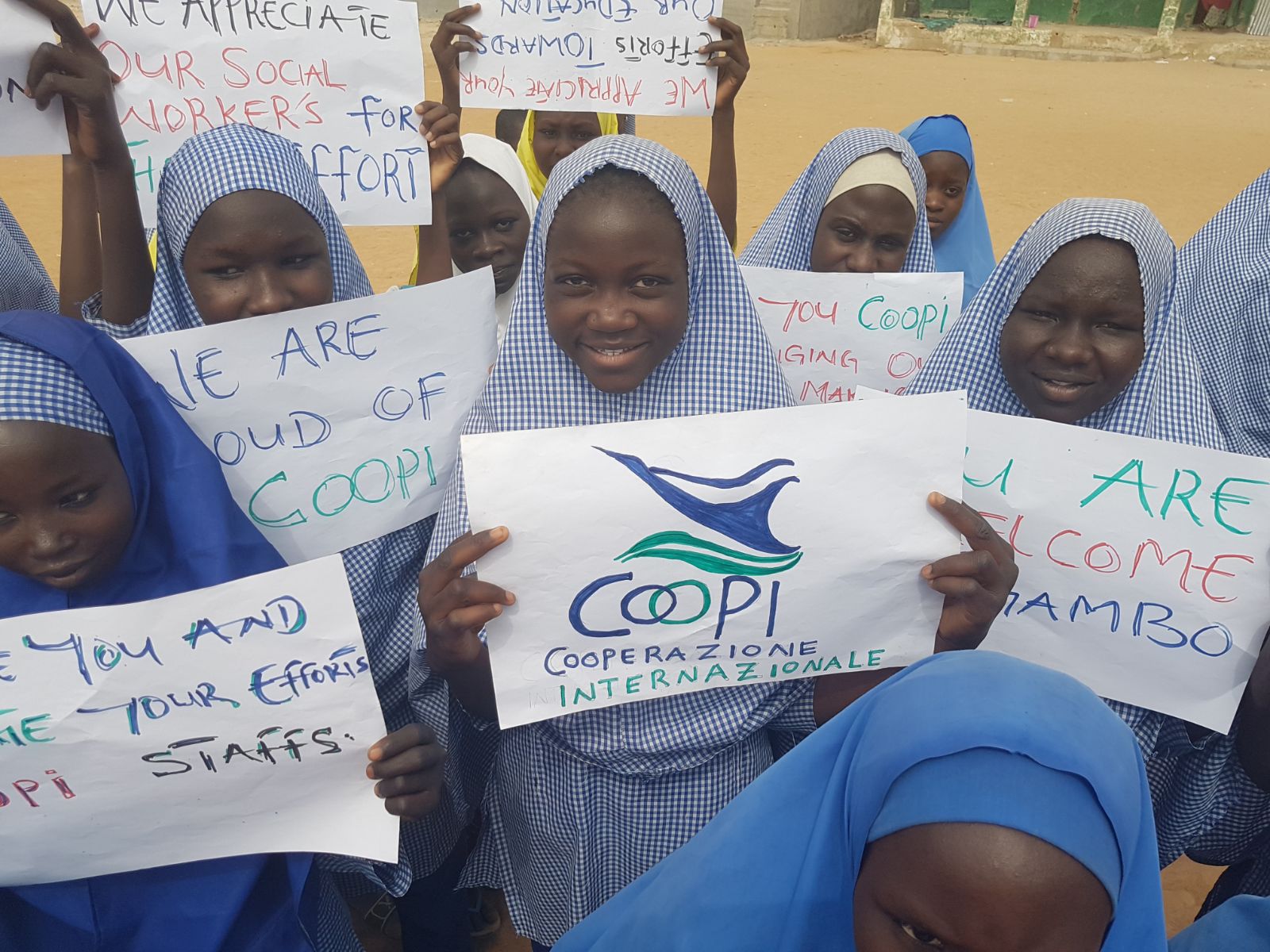Nigeria. Building Resilience from the ground in Yobe State
In the plains of Potiskum, Yobe State in the Northeast of Nigeria, the inhabitants have lived through extreme weather cycles—intense flooding followed by...
Read more
Since 2014, COOPI has been working with a multi-sectoral approach in Nigeria, implementing humanitarian assistance interventions for the most vulnerable groups and projects to strengthen the resilience of communities.
Since 2014, COOPI has been working with a multi-sectoral approach in Nigeria. In the country COOPI both implemented humanitarian assistance interventions for the most vulnerable groups and carried out projects to strengthen the resilience of communities and help them cope with the aftermath of internal conflicts and climate shocks.
In Northeast Nigeria (Yobe State and Borno State), COOPI implemented a range of projects in Food Assistance, Food Security, Nutrition, Livelihoods, Cash Transfers, Protection, Education and WASH. Our inteventions have built resilience of conflict affected households, contributed to:
In Borno State, in addition to provision of life saving food, nutrition and WASH assistance to IDPs and protection services for children affected by conflict, our intervention also extended access to quality education (formal and non-formal) and psychosocial support for school-age children in host villages and displaced communities.
In Northwest Nigeria (Sokoto and Kaduna states), COOPI carried out a rapid response to disasters by developing early warning and social protection systems. The project contributes to improve disaster preparedness, timeliness and quality of risk information and response actions for multiple natural hazards including flooding at ward, local, state and federal government levels in well-coordinated manner.

In Nigeria, COOPI implements humanitarian response activities and builds resilient livelihoods with a multi-sectoral approach and a focus on women and vulnerable groups adopting protection mainstreaming and participatory approaches.
Today, the number of displaced persons and migrants is rapidly increasing, due to adverse weather events, economic crisis, unemployment and widespread insecurity as a result of activities of armed extremist, bandits and other armed opposition groups in the country.
Our response in Nigeria combines life-saving assistance to vulnerable, conflict-affected IDPs, returnees, and host communities with cash transfers, emergency nutrition, food distribution, water, sanitation, and hygiene (WASH) interventions with longer-term resilience programming aimed at reinforcing agricultural production, disaster risk reduction and environmental conservation, conflict prevention and social cohesion, and empowering youth and women to become economically independent through investment in food value chain development, vocational skills development and support for youth entrepreneurship and participatory planning.
COOPI also focuses on the needs of conflict-affected populations by establishing community-led care services and case management systems for child protection and gender-based violence.
Since 2014, COOPI has been responding to various hazards in Nigeria. In the states of Sokoto and Kaduna, it has been improving early warning systems and a social safety net for rapid disaster response.
In north-western Nigeria, climate change-induced floods are one of the most frequent natural phenomena, thus leading to an increasing number of people vulnerable to disaster risk.
To improve early warning systems and social safety nets for a rapid response to disasters, COOPI supports the development of resilience at community level through:
project
beneficiaries
COOPI is implementing projects in Yobe covering General Food Distribution (GFD), Cash Based Transfers (CBT), Nutrition, Agriculture, Livestock, Income Generating Activities, Natural Resources Management with support from World Food Programme in Nigeria.
The main objective of the WFP supported projects are to ensure people are better able to meet their urgent food and nutritional needs. The projects provide food or cash assistance to meet the basic food and nutrition needs of targeted populations, and contribute towards restoring livelihoods and food security of affected communities through the gradual introduction of early recovery livelihoods activities to support women and youths in building skills and increase income for self-reliance.
COOPI supports IDPs, farmers and shepherds, potential entrepreneurs and rural communities with a focus on women, young returnees and vulnerable individuals through:
projects
beneficiaries
COOPI is going to implement Child Protection activities in Sokoto State with support from USAID/BHA focusing on:
COOPI is going to provide Multi-Purpose Cash Assistance (MPCA) intervention to meet multiple needs at the household level which will support WASH, Health, Food, and Nutrition. Particular attention will be given to the people who are newly displaced and those who are in the IDP camps. MPCA will also help to bridge the gap and reduce exposure to high-risk behaviors. Priority will be given to targeting lactating mothers, persons with disabilities, and female-headed households with malnourished children using the random sampling method. Cash disbursement will be done monthly using microfinance banks via smart cards/ATMs. Activities under this project include:
project
beneficiaries

COOPI main areas of intervention in Nigeria in the near future will be:
Improved humanitarian interventions.
Environmental Protection and Sustainable Development:
Protection:
Cross Cutting Issues:
Cash Working Group • Child Protection • Food Safety • Nutrition • WASH • Working Group on Prevention and Response to Gender-based Violence • Early Recovery and Livelihood
Ministry of Women's Affairs and Social Development (MWASD) • Yobe State Government • Yobe State Emergency Management Authority (SEMA) • Ministry of youth and Sport • Ministry of Commerce and Industry • Ministry of Water resources • Agricultural Development Programme (ADP) • Ministry of Agriculture
AFRYDEV • Jirah Doo Foundation
Christian Aid Ireland • International Rescue Committee
COOPI - NIGERIA Mab Global Estate, casa 127, Diamond Street, Karsana Gwarimpa, Abuja